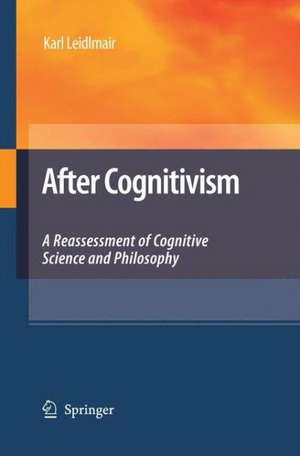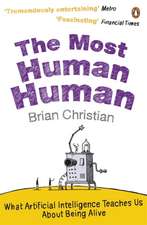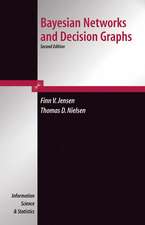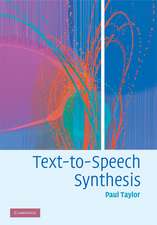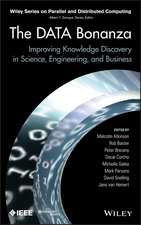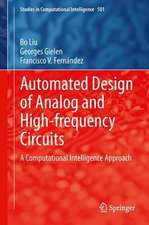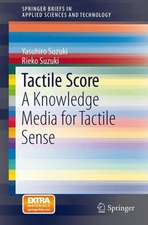After Cognitivism: A Reassessment of Cognitive Science and Philosophy
Autor Karl Leidlmairen Limba Engleză Paperback – 28 noi 2014
| Toate formatele și edițiile | Preț | Express |
|---|---|---|
| Paperback (1) | 638.11 lei 6-8 săpt. | |
| SPRINGER NETHERLANDS – 28 noi 2014 | 638.11 lei 6-8 săpt. | |
| Hardback (1) | 644.30 lei 6-8 săpt. | |
| SPRINGER NETHERLANDS – 30 sep 2009 | 644.30 lei 6-8 săpt. |
Preț: 638.11 lei
Preț vechi: 750.72 lei
-15% Nou
Puncte Express: 957
Preț estimativ în valută:
122.10€ • 127.81$ • 101.63£
122.10€ • 127.81$ • 101.63£
Carte tipărită la comandă
Livrare economică 31 martie-14 aprilie
Preluare comenzi: 021 569.72.76
Specificații
ISBN-13: 9789400791725
ISBN-10: 9400791720
Pagini: 248
Ilustrații: XVIII, 229 p.
Dimensiuni: 155 x 235 x 13 mm
Greutate: 0.35 kg
Ediția:2009
Editura: SPRINGER NETHERLANDS
Colecția Springer
Locul publicării:Dordrecht, Netherlands
ISBN-10: 9400791720
Pagini: 248
Ilustrații: XVIII, 229 p.
Dimensiuni: 155 x 235 x 13 mm
Greutate: 0.35 kg
Ediția:2009
Editura: SPRINGER NETHERLANDS
Colecția Springer
Locul publicării:Dordrecht, Netherlands
Public țintă
ResearchCuprins
The Pragmatic Dimension: A Reassessment of Scientific Theories.- Towards a Technology- and Action-Oriented Methodology of Constructive Realism.- The Three Enlightenments.- Artificial Intelligence and the Embodiment of the Mind.- How Representational Cognitivism Failed and is being replaced by Body/World Coupling.- The New Orthodoxy: Humans, Animals, Heidegger and Dreyfus.- The Key to the Chinese Room.- Socialization in the Internet Between Dissolution and Extension of the Human Self.- The Play of Imagination: Extending the Literary Mind.- Reading the World Upside Down: How to Deal with Frozen Knowledge.- On the Significance of the ‘Lower’ Senses: Touch, Smell and Taste.- New Research Strategies in Psychology and Psychotherapy.- We Can Think with the Implicit, As Well As with Fully-Formed Concepts.- Embodied Knowledge in Design.- The Second Cognitive Revolution.- Ethical and Economic Aspects.- The Illusion of Free Will and its Acceptance.- Three Concepts of Liberty.- Premises and Promises of Theory Formation in Economics.
Notă biografică
1973-1979 studies in philosophy and psychology
1979 doctorate in philosophy (title of dissertation: Die hermeneutischen Grundlagen Wittgensteins)
1990 Habilitation (habilitation treatise: Künstliche Intelligence und Heidegger)
1990 bis 1994 (co)Director of International Summer Schools In Philosophy And Artificial Intelligence, Bozen/Italy
1993-1996 research assistent at IFF (Institute for interdisciplinary studies in technology at the universities of Innsbruck, Klagenfurt and Vienna).
1.October 1997 Associate Professor at the institute of psychology university Innsbruck
1.10.2008 Head of the department of the institute of psychology
Homepage: www.leidlmair.at
1979 doctorate in philosophy (title of dissertation: Die hermeneutischen Grundlagen Wittgensteins)
1990 Habilitation (habilitation treatise: Künstliche Intelligence und Heidegger)
1990 bis 1994 (co)Director of International Summer Schools In Philosophy And Artificial Intelligence, Bozen/Italy
1993-1996 research assistent at IFF (Institute for interdisciplinary studies in technology at the universities of Innsbruck, Klagenfurt and Vienna).
1.October 1997 Associate Professor at the institute of psychology university Innsbruck
1.10.2008 Head of the department of the institute of psychology
Homepage: www.leidlmair.at
Textul de pe ultima copertă
The present book comprises a collection of papers dealing with the reassessment of thinking in Cognitive Science and in Philosophy today.
Still dependent on basic assumptions of Cartesian philosophy, Cognitive Science took over the mistakes of classical computational models. Instead of being treated as mere or pure explanations of mental processes with hindsight, these models were mistakenly used as more or less literal causal descriptions of the (working of the) mind. A clear insight into the relevance of embodied and embedded knowledge is not only a central topic in AI research; it can become a driving force for a reassessment of philosophy. Philosophy, which is struggling with the two opposite alternatives of cultural relativism and rationalism, both of which have turned out to be dead ends, is in need of a reassessment of reasoning. What is needed is a reasoning without reference to ultimate reasons which at the same time is grounded (and doesn’t fall into the trap of cultural relativism).
Still dependent on basic assumptions of Cartesian philosophy, Cognitive Science took over the mistakes of classical computational models. Instead of being treated as mere or pure explanations of mental processes with hindsight, these models were mistakenly used as more or less literal causal descriptions of the (working of the) mind. A clear insight into the relevance of embodied and embedded knowledge is not only a central topic in AI research; it can become a driving force for a reassessment of philosophy. Philosophy, which is struggling with the two opposite alternatives of cultural relativism and rationalism, both of which have turned out to be dead ends, is in need of a reassessment of reasoning. What is needed is a reasoning without reference to ultimate reasons which at the same time is grounded (and doesn’t fall into the trap of cultural relativism).
Caracteristici
Contains a comprehensive outline of the new orthodoxy in Cognitive Science Unique in covering both analytic and continental philosophy Focuses not only on new developments in Cognitive Science in a narrow sense; it simultaneously reveals the practical, ethical and economical relevance of ideas which can be traced back to Cognitive Science
